-
New York Film Festival 2012
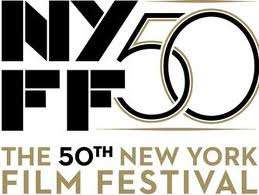

LIFE OF PI, Ang Lee, opening night
New York Film Festival 2012
September. 28 - October. 14, 2012
Welcome to Filmleaf's Festival Coverage thread for the 51st New York Film Festival, Sept. 28 - Oct. 14, 2012. The Nyff is a presentation of the Film Society of Lincoln Center, New York. Filmleaf's General Film Forum discussion thread for the NYFF begins here.
INDEX OF LINKS TO REVIEWS
Amour (Michael Heneke 2012)
Araf/Somewhere in Between (Yeşim Ustaoğlu 2012)
Barbara (Christian Petzold 2012)
Beyond the Hills (Cristian Mungiu 2012)
Bwakaw (Jun Lana 2012)
Camille Rewinds (Noémie Lvovsky 2012)
Caesar Must Die (Paolo and Vittorio Taviani 2012)
Dead Man and Being Happy, The (Javier Rebollo 2012)
Fill the Void (Rana Burshtein 2012)
First Cousin Once Removed (Alan Berliner 2012)
Flight (Robert Zemeckis 2012)
Frances Ha (Noah Baumbach 2012)
Gatekeepers, The (Dror Moreh 2012)
Ginger & Rosa (Sally Potter 2012)
Here and There (Antonio Méndez Esparza 2012)
Holy Motors (Leos Carax 2012)
Hyde Park on Hudson (Roger Mitchell 2012)
Kinshasa Kids (Marc-Henri Wajnberg 2012)
Last Time I Saw Macao, The (João Pedro Rodrigues, João Rui Guerra da Mata 2012)
Leviathan (Lucien Castaing-Taylor, Verena Peravel 2012)
Life of Pi (Ang Lee 2012)
Like Someone in Love (Abbas Kiarostami 2012)
Lines of Wellington (Valeria Sarmiento 2012)
Memories Look at Me (Song Fang 2012)
Night Across the Street (Raul Ruiz 2012)
No (Pablo Larraín 2012)
Not Fade Away (David Chase 2012)
Our Children (Joachim Lafosse 2012)
Paperboy, The (Lee Daniels 20120
Passion (Brian De Palma 2012)
Something in the Air (Olivier Assayas 2012)
Tabu (Migues Gomes 2012)
You Ain't Seen Nothing Yet (Alain Resnais 2012)
These reviews have also been published on Flickfeast.uk.

NYFF50 SIGNAGE ON FRONT WINDOWS OF RENOVATED ALICE TULLY HALL (photo by CK)
Last edited by Chris Knipp; 06-16-2016 at 01:21 PM.
-
P & I Screening Schedule

P&I SCREENING SCHEDULE
All screenings and press conferences will take place in the Walter Reade Theater, (165 West 65th Street) unless otherwise noted. (Main slate films in bold.)
WEDNESDAY, SEPTEMBER 12
P&I OFFICE OPEN FROM NOON - 5PM
NO PRESS AND INDUSTRY SCREENINGS
THURSDAY SEPTEMBER 13
10AM THE SAVOY KING: CHICK WEBB & THE MUSIC THAT CHANGED AMERICA (90 min) (ON THE ARTS Sidebar)
**PRESS CONFERENCE TO FOLLOW WITH DIRECTOR JEFF KAUFMAN
12:30PM INGRID CAVEN: VOICE AND MUSIC (95 min) (ON THE ARTS Sidebar)
**PRESS CONFERENCE TO FOLLOW VIA SKYPE WITH DIRECTOR BERTRAND BONELLO
3:00PM BECOMING TRAVIATA (108 min) (ON THE ARTS Sidebar)
FRIDAY SEPTEMBER 14
10AM THE WAR OF THE VOLCANOES (52 min) (CINEMA REFLECTED Sidebar)
Screening with: 101 (20 min)
**PRESS CONFERENCE TO FOLLOW VIA SKYPE WITH THE WAR OF THE VOLCANOES DIRECTOR FRANCESCO PATIERNO
12:15PM THE ROLLING STONES: CHARLIE IS MY DARLING – IRELAND ’65 (60 min)
**PRESS CONFERENCE TO FOLLOW WITH DIRECTOR MICK GOCHANOUR AND PRODUCER ROBIN KLEIN
2:15PM CASTING BY (94 min) (CINEMA REFLECTED Sidebar)
**PRESS CONFERENCE TO FOLLOW WITH DIRECTOR TOM DONAHUE
MONDAY SEPTEMBER 17
10AM HERE AND THERE (Antonio Méndez Esparza, Spain/US/Mexico, 110 min) (MAIN SLATE)
**PRESS CONFERNCE TO FOLLOW WITH DIRECTOR ANTONIO MENDEZ VIA SKYPE
12:45PM CAMILLE REWINDS (Noémie Lvovsky, France, 110 min) (MAIN SLATE)
3:30PM BERBARIAN SOUND STUDIO (92 min) (MIDNIGHT MOVIES)
TUESDAY SEPTEMBER 18
10AM PASSION (Brian de Palma, France/Germany, 100 min) (MAIN SLATE)
**PRESS CONFERNCE TO FOLLOW WITH DIRECTOR BRIAN DE PALMA
12:30PM THE BAY (84 min) (MIDNIGHT MOVIES)
2:30PM ROMAN POLANSKI: ODD MAN OUT (88 min) (CINEMA REFLECTED Sidebar)
**PRESS CONFERNCE TO FOLLOW VIA SKYPE WITH DIRECTOR MARINA ZENOVICH
WEDNESDAY SEPTEMBER 19
10:00AM BARBARA (Christian Petzold, Germany, 105 min) (MAIN SLATE)
**PRESS CONFERENCE TO FOLLOW VIA SKYPE WITH DIRECTOR CHRISTIAN PETZOLD
12:45PM HYDE PARK ON HUDSON (Roger Michell, USA/UK, 95 min) (MAIN SLATE)
2:45PM LIV AND INGMAR (82 min) (CINEMA REFLECTED Sidebar)
THURSDAY, SEPTEMBER 20
10AM ARAF ( ((Yeşim Ustaoğlu, Turkey/France/Germany, 124 min) (MAIN SLATE)
**PRESS CONFERENCE TO FOLLOW VIA SKYPE WITH DIRECTOR YEŞIM USTAOĞLU
1:00PM FRANCES HA (Noah Baumbach, USA, 86 min) (MAIN SLATE)
**PRESS CONFERENCE TO FOLLOW WITH DIRECTOR NOAH BAUMBACH
3:30PM YOU AIN’T SEEN NOTHING YET (Alain Resnais, France, 115 min) (MAIN SLATE)
FRIDAY SEPTEMBER 21
9:30AM BEYOND THE HILLS (Cristian Mungiu, Romania, 150 min) (MAIN SLATE)
**PRESS CONFERENCE TO FOLLOW VIA SKYPE WITH DIRECTOR CRISTIAN MUNGUI
1:00PM PUNK IN AFRICA (82 min) (ON THE ARTS Sidebar)
**PRESS CONFERENCE TO FOLLOW VIA SKYPE WITH DIRECTOR DEON MAAS
3:15PM JOHN CASSAVETES (50 min) (OPENING NIGHT OF CINEASTES)
4:10PM LANG/GODARD: THE DINOSAUR (61 min) (CINEASTES)
MONDAY, SEPTEMBER 24
10AM ONCE EVERY DAY (66 min) (SPECIAL SCREENINGS)
**PRESS CONFERENCE TO FOLLOW WITH DIRECTOR RICHARD FOREMAN
12PM DOWNPOUR (128 min) (MASTERWORKS)
2:30PM BWAKAW (Jun Robles Lana, The Philippines, 110 min) (MAIN SLATE)
TUESDAY, SEPTEMBER 25
10AM SHORTS PROGRAM #1 (91 min)
12PM CELLULOID MAN (164 min) (CINEMA REFLECTED Sidebar)
3:00PM TO BE ANNOUNCED: VIEWS FROM THE AVANT- GARDE
PLEASE NOTE LOCATION:
ELINOR BUNIN MUNROE FILM CENTER, 144 WEST 65 TH STREET
3:15PM FINAL CUT – LADIES AND GENTLEMAN (85 min) (CINEMA REFLECTED Sidebar)
WEDNESDAY, SEPTEMBER 26
9:30AM LINES OF WELLINGTON (Valeria Sarmiento, France/Portugal, 151 min) (MAIN SLATE)
**PRESS CONFERENCE TO FOLLOW VIA SKYPE WITH DIRECTOR VALERIA SARMIENTO
1:00PM MEMORIES LOOK AT ME (Song Fang, Chin, 91 min) (MAIN SLATE)
**PRESS CONFERENCE TO FOLLOW VIA SKYPE WITH DIRECTOR SONG FANG
3:30PM SHORTS PROGRAM # 2 (96 min)
THURSDAY, SEPTEMBER 27
10AM CAESAR MUST DIE (Paolo Taviani, Vittorio Taviani, Italy, 76 min) (MAIN SLATE)
**PRESS CONFERENCE TO FOLLOW WITH DIRECTORS PAOLO AND VITTORIO TAVIAN1
2:15PM NIGHT ACROSS THE STREET (Raul Ruiz, Chile/France, 107 min) (MAIN SLATE)
**PRESS CONFERENCE TO FOLLOW VIA SKYPE
3:00PM ROOM 237 (102 min) (CINEMA REFLECTED Sidebar)
**PRESS CONFERENCE TO FOLLOW VIA SKYPE WITH DIRECTOR RODNEY ASCHER AND PRODUCER TIM KIRK
FRIDAY SEPTEMBER 28
10:00AM LIFE OF PI (Ang Lee, USA, 120 min)
**PRESS CONFERENCE TO FOLLOW
1:00PM LEVIATHAN (Lucien Castaing-Taylor, Véréna Paravel, USA, 87 min) (MAIN SLATE)
**PRESS CONFERENCE TO FOLLOW WITH DIRECTORS LUCIEN CASTAING –TAYLOR AND VERENA PARAVEL
3:15PM DECEPTIVE PRACTICE: THE MYSTERIES AND MENTORS OF RICKY JAY (85 min) (ON THE ARTS Sidebar)
**PRESS CONFERENCE TO FOLLOW WITH DIRECTORS MOLLY BERNSTEIN AND ALAN EDELSTEIN
MONDAY OCTOBER 1
10AM TABU (Miguel Gomes, Portugal, 118 min) (MAIN SLATE)
**PRESS CONFERENCE TO FOLLOW VIA SKYPE WITH DIRECTOR MIGUEL GOMES
1:00PM BEYOND THE HILLS (150 min) (MAIN SLATE)
**PRESS CONFERENCE TO FOLLOW WITH DIRECTOR CRISTIAN MUNGUI
3:00PM KINSHASA KIDS (Marc-Henri Wajnberg, Belgium/France, 85 min) (MAIN SLATE)
TUESDAY OCTOBER 2
10AM FIRST COUSIN ONCE REMOVED (Alan Berliner, USA, 78 min) (MAIN SLATE)
**PRESS CONFERENCE TO FOLLOW WITH DIRECTOR ALAN BERLINER
12:15PM FILL THE VOID (Rama Burshtein, Israel, 90 min) (MAIN SLATE)
3:30PM TO BE ANNOUNCED: VIEWS FROM THE AVANT-GARDE
PLEASE NOTE LOCATION:
ELINOR BUNIN MUNROE FILM CENTER, 144 WEST 65 TH STREET
WEDNESDAY OCTOBER 3
1:00AM OUR CHILDREN (Joachim Lafosse, Belgium, 111 min) (MAIN SLATE)
**PRESS CONFERENCE TO FOLLOW VIA SKYPE WITH DIRECTOR JOACHIM LAFOSSE
2:00PM THE PAPERBOY (Lee Daniels, USA, 107 min) (MAIN SLATE)
**PRESS CONFERENCE TO FOLLOW
THURSDAY OCTOBER 4
10AM LIKE SOMEONE IN LOVE (Abbas Kiarostami, Japan/Iran/France, 109 min) (MAIN SLATE)
**PRESS CONFERENCE TO FOLLOW WITH DIRECTOR ABBAS KIAROSTAMI
1:00PM THE LAST TIME I SAW MACAO (João Pedro Rodrigues, 85 min) (MAIN SLATE)
3:15PM SOMETHING IN THE AIR (Olivier Assayas, France, 122 min) (MAIN SLATE)
**PRESS CONFERENCE TO FOLLOW WITH DIRECTOR OLIVIER ASSAYAS
FRIDAY OCTOBER 5
P&I OFFICE OPEN FROM 9AM – 5PM
10AM NOT FADE AWAY (112 min) (MAIN SLATE)
**PRESS CONFERENCE TO FOLLOW
1:00PM AMOUR (Michael Haneke, Austria/France/Germany, 127 min) (MAIN SLATE)
**PRESS CONFERENCE TO FOLLOW WITH DIRECTOR MICHAEL HANEKE
4:00PM OUTRAGE BEYOND (112 min) (MIDNIGHT MOVEIS)
MONDAY OCTOBER 8
10AM GINGER AND ROSA (Sally Potter, UK, 89 min) (MAIN SLATE)
**PRESS CONFERENCE TO FOLLOW WITH DIRECTOR SALLY POTTER
PLEASE NOTE LOCATION:
ELINOR BUNIN MUNROE FILM CENTER, 144 WEST 65 TH STREET
TUESDAY OCTOBER 9
10AM HOLY MOTORS (Léos Carax, France, 115 min) (MAIN SLATE)
**PRESS CONFERENCE TO FOLLOW
1:00PM THE GATEKEEPERS (Dror Moreh, Israel/France/Germany/Belgium, 97 min) (MAIN SLATE)
**PRESS CONFERENCE TO FOLLOW
3:30PM COUSIN JULES (91 min)
(MASTERWORKS)
WEDNESDAY OCTOBER 10
10AM THE DEAD MAN AND BEING HAPPY (Javier Rebollo, Spain/Argentina, 94 min) (MAIN SLATE)
**PRESS CONFERENCE TO FOLLOW WITH DIRECTOR JAVIER REBOLLO
THURSDAY OCTOBER 11
NO SCREENINGS
FRIDAY OCTOBER 12
10AM No (Pablo Larraín, Chile/US, 110 min) (MAIN SLATE)
**PRESS CONFERENCE TO FOLLOW
SATURDAY OCTOBER 13
NO SCREENINGS
SUNDAY OCTOBER 14
9AM FLIGHT (Robert Zemeckis, USA, 138 min) (MAIN SLATE)
**PRESS CONFERENCE TO FOLLOW
Last edited by Chris Knipp; 09-24-2012 at 05:05 PM.
-
Here and There (Antonio Méndez Esparza 2012)
ANTONIO MÉNDEZ ESPARZA: HERE AND THERE (2012)

Back and forth
The plight of a migrant worker is the burden of a coldly documentary-style first feature by young Mexican filmmaker Antoinio Méndez Esparza. Espara blends vérité-style editing and casting methods with artistic ellipsis in telling what happens when his rather apathetic protagonist Pedro (Pedro de los Santos) returns home to his remote mountain village in the province of Guerrero after years of working at odd jobs in the States. The storytelling is too free to appeal to a conventional audience; this is neorealism drained of its former energy an deadened by a sense of hopelessness much more 21st century than post-WWII.
"Allá" ("there") in the title refers to the USs. Why Pedro comes back home from there isn't specified, presumably missing his family and wanting to be back home. His 30-year-old wife Teresa (Teresa Ramirez Aguirre) seems as apathetic as he is, and suspecting he'd have had girlfriends in the States, is withholding at first. His two schoolgirl daughters Heidi (Heidi Laura Solano Espinoza) and Lorena (Lorena Guadalupe Pantaleon Vazquez) are giggly and distant. In one of the most telling scenes, Pedro takes Heidi and Lorena to a lake he's long dreamed of visiting with them. But the visit, like much else, is flat. His efforts to start a band -- he's a singer and guitarist -- are also lackluster. Performing is obviously the most fun Pedro has in his life, but his "Copa Kings" group gets him deep in debt for equipment and work draws members away.
That's the introductory section. The second one,"Aquí ("Here"), is a grim sequence in which Teresa has a medical crisis during pregnancy, and the baby girl, their third daughter, almost dies after a caesarian birth while Teresa, weakened from loss of blood, is consequently forced to lie for days in the hospital without seeing her newborn. The hospital stay -- for which he must supply medicines and blood donors -- gets Pedro further in debt. The result: day labor.
In a third chapter, "Horizonte" ("Horizon"), the film follows Pedro's continuing tough life in Mexico and also visits Nestor (Nestor Tepetate Medina), a youth who wants to migrate to El Norte and practices break dancing -- his life perhaps destined to parallel Pedro's. Pedro is seen applying for work at multiple construction sites, work options apparently running dry. Part three is both depressing and desultory, studiously avoiding definite outcomes.
The conclusion is nonetheless obvious. In the final section, "Allá" ("there") -- Pedro is forced to return to the US, where he can at least find work even if it doesn't pay very well. The film doesn't show Pedro in the US; when he leaves, the point of view stays in Guerrero province. Esparza cheats a bit in this rushed last chapter, unless it's meant as an epilogue. Esparza stages a perfunctory conversation between Heidi and Lorena about whether, or how much, they miss their now again absent father. Then the film shows a sound-only tape from a scene of Pedro performing songs at home with his family, while showing footage of the town Pedro himself no longer in sight.
The documentary style makes it hard to tell how much the family members are meant to be apathetic or how much the non-actor cast members, lacking forceful direction, are merely to shy and inexperienced to project emotion. One may correspondingly ask at times if the omission of narrative links is sophistication or directorial clumsiness. Dialogue is often crudely expository. Characters say exactly what they are meant to be feeling, or what we're supposed to learn. With his ethnographically exact settings and people, Esparza would be presenting a shatteringly strong picture of the fragmentation of families and banishing of hopes for the Mexican migrant poor. But the prevailing listlessness makes it hard for a viewer to respond. Esparza has not drawn satisfying performances from his indigenous cast, whose dialogue often seems the mere mouthing of a scene outline. The effect is often quite unconvincing. Esparza's methods show a debt to Carlos Reygadas, but he lacks Reygadas' bold vision and skill with non-actors.
Aquí y allá nonetheless did well at Cannes, winning the top prize of the 2012 Critics' Week series, which will guarantee further festival exposure and help the director pursue further projects. Those who admire the film see it as beautifully understated, its lack of resolution helping to highlight Es[arza's themes. Barbu Balasoiu's camera work has drawn praise for nice color and light, though its neutrality underscores the flatness of most scenes.
Screened as part of the New York Film Festival 2012, at Lincoln Center.
Last edited by Chris Knipp; 09-17-2012 at 06:06 PM.
-
CAMILLE REWINDS (Noémie Lvovsky 2012)
NOÉMIE LVOVSKY: CAMILLE REWINDS (2012)
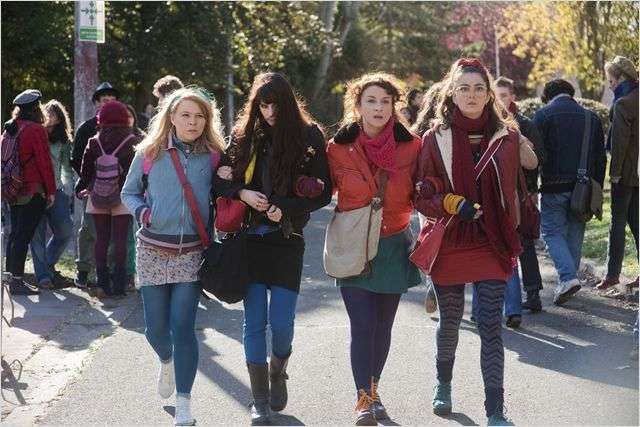
INDIA NAIR, JUDITH CHEMLA, NOÉMIE LVOVSKY, AND JULIE FAURE IN CAMILLE REWINDS
Peggy Sue, in French
The prolific Noémy Lvovsky, who writes, directs, and frequently acts, stars in this buoyant, colorful French fantasy (which she directed and co-scripted) about a middle-aged woman in crisis. Camille (Lvovsky) is an actress who can't get much work. Her latest job consists of screaming while she gets her throat cut in bed and spurts fake blood. She is a heavy drinker and tokes on a bottle even on the Métro going home. There, things are getting packed up because she and her husband are divorcing. It's New Year's Eve and she goes to a wild party. In the aftermath she falls into a deep sleep in which she returns to her high school years -- and tries to change things. It's a French take on the kind of theme that's familiar from Hollywood movies and sci-fi. In fact this is more or less a free remake of Coppola's Peggy Sue Got Married. It's rather amusing to see it done with French actors, including some prestigious and sophisticated ones like Matthieu Amalric and Denis Podalydès, with none other than Jean-Pierre Léaud as a histrionic watchmaker and the great Yolande Moreau as Lvovsky's mother. The whole effort may seem to add only a few new touches to the stereotypes; subtleties will be more perceptible to the Gallic audience than Stateside, but this is an enterprise notable for its energy and enthusiasm throughout and shows Lvovsky's fluidity as an actress and fluency as a director.
To give you an idea: Lvovsky has performed in 97 films. Just recently she played the Madam is Bertrand Bonello's justly admired 2011 House of Tolerance, and then switched from the turn of the century to the French Revolution to play an important member of Marie Antoinette's entourage in Benoît Jacquot's Farewell, My Queen. She's far from an actress who can't get work: she's indispensable. She doesn't need to write and direct movies, and we might see Camille redouble as something of a vanity piece. She does stage some witty changes though. When Camille finds herself back at home with her parents going to the lycée and falling in love with her future, presently estranged, husband Éric (Samir Guesmi), they both play themselves, at their present age. Nobody seems to notice.
The usual stuff follows. Camille does all she can to avoid getting inovolved with Éric, knowing that the resulting marriage is going to end badly. She connects with a much older man, a physics prof (Podalydès), to whom she confides the time-travel thing that's gong on and seeks his help as a connection when for she returns to the Obama era. She also knows that shortly after her sixteenth birthday, when she has gotten pregnant by Éric (who's madly in love with her) her mother is going to die of a heart attack, and she seeks to prevent that. Spoiler alert: she fails. Things do seem to change between her and Éric, in a feel-good sort of way.
I'm not going to claim that this movie is uperior to its Hollywood equivalents -- it's just French, and it's interesting to see how Lvovsky has reshaped the theme to her own sensibility and preoccupations. It's fun for French film fans to see Matthieu Amalric done up as a particularly dorky high schoo teacher whose authoritarian manner touches off a student revolt. Lvivsky and Guesmi are personable and lithe enough to make their momentary return to lycée-age occasionally believable, despite their keeping their adult shape. Guesmi, particularly, looks youthful, till you see his face up close. Lvovsky's mature woman's body comes in for some funny comments when the other girls at a gym class do an impromptu eval of her body part by body part. But what's particularly French is the willingness to put middle-aged actors in the role of adolescents and not be ashamed at the contrast. Lvovsky has a warm, appealing mistress-of-the-revels sort of personality and easily plays a woman able to handle time travel with suppleness and good humor. Camille Rewinds is also a way of showing Lvovsky's warm sympathy toward adolescence, as well as her belief in giving marriages a second chance. On a superficial level, the film moves along with energy, the scenes (handsomely shot by Jean-Marc Fabré) are bright-colored, the Eighties clothes and music are fun and played for sympathy rather than caricature, and the party and dance sequences further liven things up. The only trouble is what Justin Chang noted in his Variety review at Cannes: it goes on a bit too long: the 115 minute runtime could lose a quarter of an hour or so. But this does show that the French filmmaking machine is in working order, and can do almost anything.
Camille redouble received the Prix SACD 2012 prize at the Cannes Directors Fortnight series. It opened in Paris September 12 (last Wednesday) to very good reviews (Allociné press rating: 4.2) Watched at the 2012 New York Film Festival press screenings.
Last edited by Chris Knipp; 03-10-2018 at 06:47 PM.
-
PASSION (Brian De Palma 2012)
BRIAN DE PALMA: PASSION (2012)
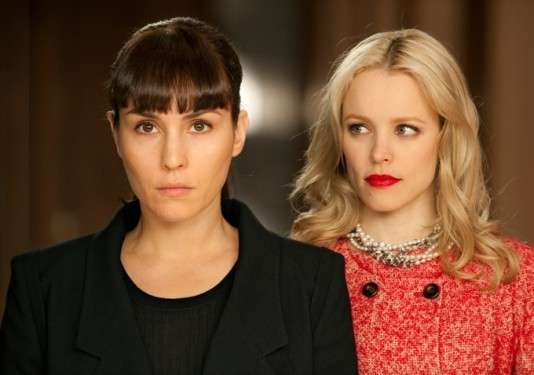
NOOMI RAPACE AND RACHEL MCADAMS IN PASSION
De Palma being De Palma doing Corneau
Brian De Palma's Passion will please his ardent fans but this close but uninvolving remake of the late Alain Corneau's last film Love Crime (RV 2011) is just eye candy. Its slight variations on the already far-fetched original and its new casting do not impress. Corneau was making a sort of Hitchcock thriller. It's an old school film noir that set itself a problem: how about getting away with the perfect crime by first making yourself look guilty? The already dated quality of Corneau's movie may have been what De Palma liked. He has added a kind of Almodovar-esque gloss (with some pointless split-screen ballet images and cross-cutting that may owe something, with the bright color, to the Spanish director). He has made an even less realistic movie and tried to make the emotions more extreme and the hi-tech touches more numerous. Though his addition of Skype calls, cell-phone videos and security cameras adds a suggestive modern touch, none of these additions to Corneau's version really work. This is such a decadent effort, even the perfect crime theme gets submerged in the obsession with baroque beauty and campy style.
One is in the awkward position here of trying to show how a movie fails to live up to the standards of another one that was not that great to begin with. But however much De Palma outdoes himself this time, he loses the good qualities Corneau's movie had. In Corneau's 2010 version (and Love Crime/Crime d'amour is a better title than Passion, by the way), Kristen Scott Thomas was Christine, the chilly, dominant CEO of a European corporation, and Ludivine Sagnier was Isabelle, her admiring, manipulated surrogate whose jealousy and anger lead her to homicide. Rachel McAdams is far less effective as Christine, and much younger. It's hard to see her as a CEO. Scott Thomas' haughty elegance and fluency in French and English and her age put her in another category altogether. As Isabelle, Sagnier gave one of her best performances, full of insecurity and eagerness. Noomi Rapace, who has disappointed in her new Hollywood star status so far, is too mousy and strange looking to be someone a powerful female CEO would take on and even pretend to consider as a lover. De Palma predictably hits the lesbian theme far harder, as part of generally upping the camp level of the film, also predictable. The original idea was that Isabelle didn't quite know where she stood with Christine. Despite the luridness of Rapace's and McAdams smooches and more lip-locking with Dani (Karoline Herfurth), Isabelle's German assistant, who's not only a female but an intense lesbian in this new version, De Palma generates less intensity overall than Corneau did because of the lack of psychological realism.
The subtlety of Corneau's movie (which disappears in its hokey post-crime segment) is in how it shows the cruel manipulations of the corporate world, the greed, jealousy and ambition. These work well because Scott Thomas, Sagnier, and Patrick Mille as Philippe, a suave, attractive male employee whom the two women share and whom Christine blackmails, fit so well together. Again the casting fails De Palma because the English actor Paul Anderson is a caricature who seems stressed out and over-the-top from when he first appears. Corneau's office scenes are more believable. He is better at conveying the sense of high-powered business dealings going on. De Palma's reliance on a trendy video as Isabelle's springboard to success makes the material too trivial and media-based. De Palma's actors just seem to be posing in the big corporate spaces; Corneau's inhabit them naturally.
It might have been better to play up Rapace's mousiness. It might have made her seem so inadequate that her feelings would be warped and she would be overcome by jealousy, humiliation, and resentment as soon as she realized Christine was manipulating her. In Corneau's version, with Ludivine Sagnier in the role, Isabelle is a slow burn, resisting anger as long as she can because of the power she's had a taste of. It's not clear what's happening to Rapace's character.
After the crime, nothing makes sense in either movie. While Corneau's Love Crime was an entertaining psychological study, it fell apart as a police procedural. De Palma's Passion doen't work in either genre. The images by Jose Luis Alcaine are such gorgeous eye candy that they may stop registering as anything but artwork after a while. Likewise Pino Donaggio's lush score, which underlines the suspenseful bits in a Bernard Hermann mode, makes the movie even more Hitchcockian and even more artificial.
Passion debuted at Venice, with showings at Toronto and the New York Film Festival swiftly following in September 2012. Screened for this review as part of the NYFF at Lincoln Center, at which time time it had not yet acquired a US distributor. French, German and Dutch releases (the film is set in Berlin in place of Corneau's La Défence, Paris location) are scheduled for February 2012.
Last edited by Chris Knipp; 09-19-2012 at 07:55 AM.
-
BARBARA (Christian Petzold 2012)
CHRISTIAN PETZOLD: BARBARA (2012)
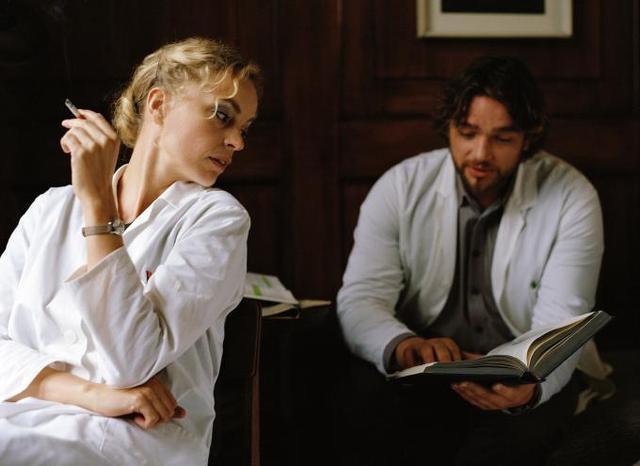
NINA HOSS AND RONALD ZEHRFELD IN BARBARA
The feeling of repression
There's a lot going on under the surface in Christian Petzold's slow-burning Barbara, the story of a woman doctor banished from Berlin to the provinces in 1980 East Germany. This winner of several important German film awards (including the number two director prize at Berlin), owes everything to the impeccable cool of of Nina Hoss, in the title role here, and collaborating with Petzold for the fifth time. This is another example of how emotionally subtle and intense the chilly perfection of the new German or "Berlin" school of filmmaking can be.
When Barbara (Hoss) shows up at the rural hospital she keeps "separate," refusing to share a lunch table with colleagues, but Andre (Ronald Zehrfeld), the warm and soulful head doctor, is persistent. Pretty quickly we understand Barbara's reserve, even hostility: she is being watched, and even Andre is probably reporting on her. If the story he tells her is true, a major fuckup at Berlin Charité that he was responsible for led to his being exiled here, and he's only allowed to keep practicing as a doctor in exchange for aiding the security system. But both he and Barbara are serious about their work and caring toward their patients. Hoss' slow warming up is an impressive example of her subtle control as an actor.
Slowly plot elements accumulate. Barbara has a boyfriend in West Germany (Mark Waschke) who sneaks in occasionally to visit (leaving telltale quality cigarettes with her) and is planning to get her out of the GDR and into Denmark as soon as possible. This is the time bomb that makes every scene quietly suspenseful. Two young people show up in the hospital as patients who are examples of the brutality of the government. Stella (Jasna Fritzi Bauer) ran away from a work camp and contracted meningitis hiding in the fields; she is also pregnant. Similarly oppressed is young Mario (Jannik Schumann), who jumped out of a building in a suicide attempt and may have brain damage. Barbara bonds with Stella closely; it's Andre who's most concerned with Mario. One wonders at times if Barbara will shift her loyalties from her boyfriend to Andre, since it seems also at times that her duty to her patients might override the escape schedule.
The country setting, with its quiet, its greenery, its excellent vegetables and its healthy air, helps Petzold to keep his picture of GDR repression subtly understated so that we absorb it inwardly and feel it better than happens with more conventional or obvious depictions. Without the more obvious trademark images of Soviet era shabbiness, the omnipresent propaganda, the conspicuously missing luxuries, the dictatorial bureaucracy or the overt cruelty, the viewer is encouraged to internalize a sense of the world without freedom, one that grows out of simply observing Barbara's face and her interactions with Andre and others. There is no mistaking the spartan nature of her assigned apartment or the Stassi agents who show up now and then for strip searches and the man who keeps parking his little car outside (Rainer Bock), but this is lean and mean filmmaking where everything counts and nothing is overdrawn.
In a pared down style more extreme than the director's memorable 2008 Postman Always Rings Twice remake Jerichow, Barbara (FCS 2009) is so minimal it feels a little tight, and at the end is anticlimactic. Mike D'Angelo noted in a Toronto tweet review that it's "exquisitely made," but said he was "disappointed" when a "conventional shape" eventually appeared "beneath layers of subtle misdirection." The film has to go somewhere, and when it does, it loses some of the pushes and pullls that kept us on the edige of our seats. Nonetheless Petzold seems close to the top of his game and his sense of the communist world is almost thrillingly uncluttered and fresh and his writing shows a gift for quietly making the social and political shine out cllearly through the personal.
Since its February 2012 Berlinale debut Barbara has been released in over a dozen countries, mostly European. A UK release is set for September 28, limited US release December 21. 2012. Watched for this review at the press screenings of the New York Film Festival, Lincoln Center.
Last edited by Chris Knipp; 07-24-2014 at 12:35 AM.
-
HYDE PARK ON HUDSON (Roger Mitchell 2012)
ROGER MITCHELL: HYDE PARK ON HUDSON (2012)
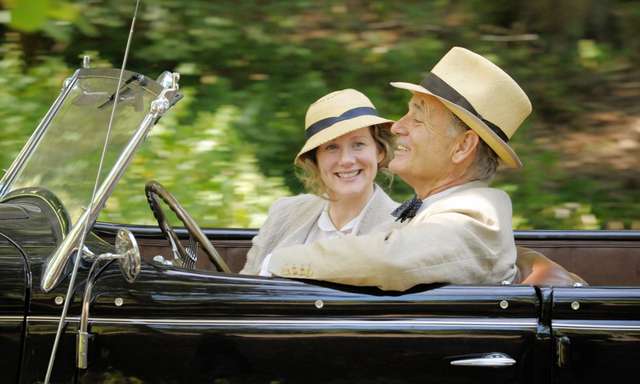
LAURA LINNEY AND BILL MURRAY IN HYDE PARK ON HUDSON
Monarch and president: just folks, insecure and naughty
In this cuddly and blunt-spoken romp in 20th-century American history we visit FDR & Co (including wife and three lovers) in the Thirties, before the war, at the estate he liked to summer at, owned by his mother (Elizabeth Wilson). We arrive at this location for the comically momentous occasion when the King and Queen of England come to visit, seeking financial aid and promises of military support in the coming war, and receiving in return cocktails and hot dogs. This could very well be a play, despite the rollicking drives on grassy country roads in an open car by Roosevelt (Bill Murray), driving his latest "companion" and sixth cousin Daisy Stuckley (Laura Linley), but the cars and the houses and the accoutrements bring things to glossy life. Like The King's Speech, of which it could be seen as a marketable if minor extension, this is a portrait of the English royals (as well as the elected Yank version) that balances unflattering with appealing. FDR may be a philanderer and a drunkard, but he's honest and funny and brave in dealing with his disability. And "Bertie" and the Queen may be bumbling and insecure, but they're plucky and flexible. This movie, however, is just an anecdote, lacking the grandeur, fluency, or triumph-over-adversity appeal that made The King's Speech a big winner at the box office and awards ceremonies.
A key for audiences will be how well they accept the gimmick casting of tongue-in-cheek actor Bill Murray in the historical role of FDR. And this versatile comedian-actor performs well. Though the excuse is that this is a private FDR and not the public one, there is none of the resonance and authority of FDR the world leader. Nor has Olivia Williams the oddity and conviction of Eleanor. As the stuttering King George VI, Samuel West (the son of Prunnella Scales) is rather good, again like Colin Firth, but without the charisma, managing to convey the sense of being a stutterer while still delivering a goodly number of lines. Another key is whether Daisy, whose voiceover narration runs through the whole thing, is an appealing enough character, despite the fact that the royal visit, the semi-catastrophic dinner, and the comical picnic the next day overwhelm her personal story. One of the interests of the screenplay by Richard Nelson for modern audiences, particularly young ones if any show up for this movie, is to see a vastly different presidency, where the head of state could wave the Secret Service car away and drive off with his new girlfriend to get a blowjob in a field seen only by the birds and the bees, and he could be carried around from room to room or hobble on crutches and never have that shown by photographers (just as they never delved into his extra-marital affairs or his wife's lesbian tendencies). Hyde on Hudson is a good, if blatant, depiction of the safe disconnect in those freer, more privacy-respecting days between private secret and public façade.
Though this tale is made for screen not stage, there is a sometimes excessive reliance on business -- cigarette holders (and the lighting and passing around of cigarettes), cocktails and cocktail shakers, magnifying glass and stamp collection, and cars. The royals are English so, okay, they must arrive in a long black Rolls (I guess the official royal car, the Daimler, wasn't available stateside?), but how many times must we pile back into FDR's sporty convertible? it seems at times that nobody has anything of importance to say, except to reassure each other that it's all going to go alright. This is, in part, a dramatization of Americans' and Englishmen's mutual uneasiness, particularly with regard to the monarchy, its trappings, and its terms of exaggerated respect, which Franklin's mother is keen on and Eleanor snubs. In the end this is no more interesting than the Queen's and King's confidential debate about whether being served hot dogs is an insult or just a convenient thing to have when eating out of doors.
Murray performs creditably with restraint, but the fact that he has performed in films by the likes of Sofia Coppola, Jim Jarmusch and Wes Anderson reminds us that he can be used to far subtler effect than happens with the Notting Hill director Roger Michell, who as Peter Debruge says in his Variety review "has made a career blending high class with coarse elements," so that "same off-color tendency creeps into what might have been a broad comedy of manners." Hyde Park on Hudson serves "coarser motives." That's the truth of the matter: there's something icky about it, and it's neither witty nor profound.
Hyde Park on Hudson, whose excuse for being included in the New York Film Festival may have to be attributed to its association with New York, got its debut at Telluride and got an additional springboard at Toronto. It's a broad audience-pleaser if without the wide appeal or depth of The King's Speech. It gets Dec. 7, 2012 US release and Feb. 1, 2013 in the UK and Feb. 27 in France.
Last edited by Chris Knipp; 12-07-2012 at 11:32 PM.
-
Yeşim Ustaoǧlu: ARAF/SOMEWHERE IN BETWEEN (2012)
YEŞIM USTAĞLU: ARAF/SOMEWHERE IN BETWEEN

BARIS HACIHAN AND NESLIHAN ATAGÜL IN ARAF
By the wayside
Debuted at Venice, the Turkish female director Yeşim Ustaoğlu's fifth feature Araf is about a teenage girl working at a highway restaurant who falls for an older man who'se a truck driver, who gets her pregnant, then fades out of the picture. A young coworker is in love with her and eventually they get together, but under unusual circumstances. It may be unusual even to have a female filmmaker in Turkey, and Ustaoğlu has chosen a bold theme, which she develops with excruciating, drawn-out realism. There are surprises. Things seem depressing, yet there's almost a feel-good ending: the outcome for the young woman, Zehra (Neslihan Atagül) and her disenchanted beau Olgun (Baris Hacihan) is still hanging "somewhere in between" -- and the Turkish word araf means limbo, or even purgatory -- but the lovely classical Turkish orchestral piece that accompanies the closing credits is full of warmth and hope. Events are excruciatingly slow to unfold; the 128-minute runtime might have been reduced by 20 minutes. But the editing is assured, and the widescreen color cinematography by Michael Hammon is almost distractingly beautiful. The images and wintry setting expressionistically underline the themes and situation. A lot here has class, but there's serious misjudgment in the drawn-out, disgusting miserable lives (poisoned dogs, drunkenness, spousal abuse, a too-vivid miscarriage), the feel-good finale is gratuitous and tacked-on, and most of the film meanders aimlessly. Can one recommend this film? Certainly not. Do the director and her young actors Atagül and Hacihan have talent? Definitly yes.
When the attractive Zehra first sees the grizzled Mahur (Ozcan Deniz) pulll up in his big truck she is fascinated. She knows Olgun, a young man with a sensual face, is interested in her, but she rebuffs him. Both Zehra and Olgun are paired with best friends. When Olgun's, who trawls websites with him looking for sex, announces that he's being drafted into the army, they speculate about how they will survive without each other's company, but Olgun shows his sensitivity, or romanticism, by declaring that their friendship is a love he carries deep in his heart. Zehra's best pal is her older but handsome-looking co-worker Delya (Nihal Yalcin). Delya too surfs the Internet with Zehra, urging her to consider better jobs and the possibility of dating men beyond their little area in the Caucasus, which is not prosperous.
A major scene is a wedding arty that Zehra sneaks off to with Delya, against the wishes of her stolid mother. For whatever reason, all the principals are there, and Zehra dances up close to Mahur, while Olgun dances close by, but outside Zehra's interest range. For some reason Ustaoğlu chooses to keep the encounters between Zehra and Mahur almost completley wordless, except for Zehra's plea, "Take me with you." It's not heeded. While Zehra is finding out she's pregnant by Mahur, and Delya gradually reveals that she'd gone through something similar and gave up the baby for adoption, Olgun is flying into a furious rage with his mother, who goes off, and his father, who is a drunken pig. His actions lead to prison.
Araf/Somewhere in Between debuted at Venice. Screened for this review as part of the New York Film Festival at Lincoln Center.
Last edited by Chris Knipp; 09-20-2012 at 10:34 PM.
-
Noah Baumbach: FRANCES HA (2012)
NOAH BAUMBACH: FRANCES HA (2012)
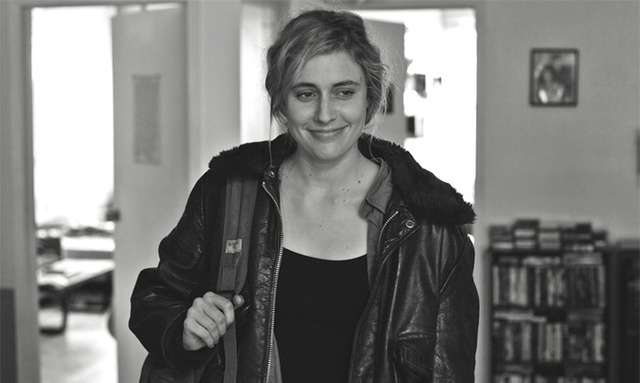
GRETA GERWIG IN FRANCES HA]
Defining twenty-somethings
Frances Ha is a vehicle for Baubach girlfriend and mumlecore queen Greta Gerwig. Gerwig is a charmer who is appealing, humorous, and authentic and has a kind of glow about her on screen. Recent appearances (does her IMDb CV only go back to 2006?) in Baumbach's own Greenberg, No Strings Attached, and Whit Stillman's Damsels in Distress, a virtuoso verbal performance for her, she her increased mastery and an inching toward the mainstream. But Frances Ha is like a more pro-quality mumblecore film, a reaffirmation of indie loyalties by both Gerwig and Baumbach. Frances Ha, which is in black and white and largely set in Brooklyn, is a return to Baumbach's New York origins after his California digression. It isn't really about anything, as a whole. It's organized by addresses, at least half a dozen of them, mostly in New York City (with a penultimate period of exile), and the best, early, part of it is about the interaction for Frances and her twenty-something cohorts between job, relationship, career ambitions, and apartment. The funniest, smartest, and most original scenes and dialogue show how who you're sleeping with relates to your rent, your address, and whether you can pursue your ambitions or have to stick to a day job. If this movie succeeds, and its shapelessness makes that uncertain, it could redefine how young urban Americans are shown on film and move forward Baumbach's and Gerwig's careers. Or it might just be a video classic, like Baumbach's obsucre debut film Kicking and Screaming, which is in the Criterion Collection and which in some ways this film is closer to than to any of his subsequent efforts. The topic of both is that neverland between college and Life.
Some of the guys are quick-witted and funny, but they are unreliable and they change. Connecting thread turns out to be Frances' bgf Sophie, played by the English actress Mickey Sumner (daughter of the singer Sting). Sophie wears nerdie glasses, but has a good job and a fiance, a banker called Patch (Patrick Heusinger), a good old boy who says things like "I'm goin' to take a leak." Till Patch came into the picture, Frances and Sophie were clearly not thinking of marriage and saw themselves as living together "like an old lesbian couple that doesn't have sex." When on her own, Frances shares an apartment for awhile with two too-well-off "creative" young men who fail to see how privileged they are, one of whom calls her "undatable." She takes a Christmas trip to her parents in Sacramento to avoid her fracturing New York connections. Then after the Paris débâcle, she accepts not joining the dance troupe, perhaps, since she's at that definitive age of 27, the beginning of Life.
Frances Ha's dialogue is so specific and amusing and defines its young Williamsburg, Brooklyn subculture and generation so precisely, that there isn't really room for much to happen. And besides that there is the mumblecore generation's chronically vague commitment-averse quality. Frances wants to be a dander, though; but she has to settle for a desk job at the dance troupe she wanted to join, along with putting on a small dance event of her own that gets complimants from the troups'e leader -- but no contract. One of the defining (but typically directionless) sequences has Frances impulsively take a weekend in Paris, because people she knows offer her an apartment to stay in, but she can't connect with her frineds there and has to return to New York before she's recoverefd from jet lag.
In his admiring Telluride review for Variety Peter Debruge links Frances Ha with a class of "raggedy yet sincere semi-autobiographical films surfacing these days at Sundance, SXSW and other U.S. fests," but notes the important differennce of Baumbach's more mature and polished point of view, plus links with the French New Wave (to which there are conscious allusions), Woody Allen (with Allen's Manhattan an obvious link, since this too is in black and white) and "Andy Warhol's Factory films." All this Debruge asserts enables Baumbach to "capture a reality that has eluded him on his more polished dramedies." This is quite true. Baumbach was more mainstream and generic in most of his previous movies. Frances Ha also outdoes mumblecore by having a script, which Baumbach and Gerwig carefully crafted together.
Frances Ha seems only partly a breakthrough for Baumbach. It's a reviving and improving upon his roots, and it allows Gerwig to glow and be hilariously and winingly unpredictable and witty as only she can, but time and the box office will tell if the public will respond despite the plotlessness and the somewhat neutral grayish black and white. As Baumbach noted in a press Q&A for the New York Film Festival, it is almost impossible to shoot in traditional black and white any more, because you can't get the film processed. He was forced as others have been to shoot in digital color, and convert it to black and white, which is a little too metallic-looking for my taste here.
The film debuted at Telluride Sept. 1, then Toronto Sept. 7, and New York (Lincoln Center) Sept. 30. Screened for this review as part of the New York Film Festival. Release by IFC Films in March 2012 is expected.
Last edited by Chris Knipp; 05-24-2013 at 10:12 PM.
-
Alain Resnais: YOU AIN'T SEEN NOTHING YET (2012)
ALAIN RESNAIS: YOU AIN'T SEEN NOTHING YET (2012)
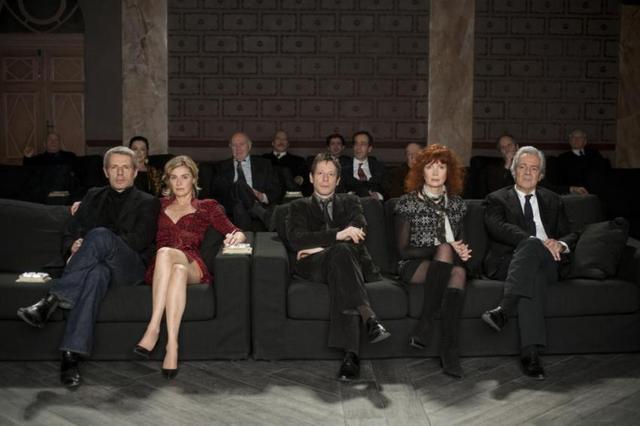
Layers of memory, layers of performance
The 89-year-old perpetual experimenter Alain Resnais' latest film, Vous n'avez encore rien vu, more catchily rendered in English as You Ain't Seen Nothing Yet, is a conceptual piece about classical theater and the way actors internalize key roles they have played. Call it meta-theater, if you will; like most of the veteran New Waver's more recent works, it eschews the cinematic in favor of the elegantly stagey. Everyone is well groomed and impecably dressed. There is one modern touch: a big flat-screen TV. In the opening credits sequence, thirteen well-known French actors are summoned (by their real names) to one of the many estates of a theater director, Antoine D'Anthac (Bruno Podalydès), whom they're informed has just died. When they get there the deceased's butler acts as master of ceremonies and clicks on the TV where a pre-recorded D'Anthac welcomes them and announces they will watch and comment on a new warehouse-staged production of Jean Anouilh's 1941 play Eurydice, which they have all played in. (That play is a source for the film, and also another play by Anouilh, Dear Antoine.) But when the younger cast goes into action, the thirteen veterans alternately take up their lines. What all this adds up to is anybody's guess. There's something soothing in the formality and artificiality of the proceedings. But their failure to go anywhere and the extreme repetitionsness of the film will keep it from playing well to a non-festival audince.
At first the actors, who include Resnais' wife and longtime muse Sabine Azéma, Michel Piccoli, and Matthieu Amalric as well as Lambert Wilson and Anne Consigny, are sitting around in big black armchairs. Then as the young actors speak, they begin not just mouthing lines with them but getting up to say them, and at times they are injected by green screen into the play's two main settings, a train station restaurant and a shabby hotel room. There are three sets or actors who have played the couple, Orpheus and Eurydice: present in the mansion for the ceremonial observance set up by the late director are Pierre Arditi+Sabine Azéma and Lambert Wilson+Anne Consigny; on screen in the youthful warehouse version, Sylvain Dieuaide+Vimala Pons.
The older actors sitting around in the mansion played Eurydice in the past, so their return to their roles may also evoke their own past, and perhaps ways in which their own lives and Anouilh's classical Greek characters are intertwined in their minds. Perhaps they're trying to return to their youth. With actors of this quality (and they are the best) and staging, filming, and editing on an equally high level, there is some pleasure in watching this business. But when the person nearest me at the screening dozed off I was not much surprised. As Peter Bradshaw wrote in the Guardian about the film when he saw it at Cannes, "despite its moments of charm and caprice, the film is prolix, inert, indulgent and often just plain dull."
Often but not always, and it would be foolish to watch this and find no meaning in it. Bradshaw note the obvious fact that the Greek theme of Orpheus refers to nostalgia, a thing an old artist might well be thinking much about. The theme of Orpheus partly means that "by looking back at her in the underworld, he loses her," as Bradshaw puts it, suggesting Resnais may be saying looking back is stifling and we must live in the present, no matter what. Mike D'Angelo in tweets from Cannes rated the film highly in his severe system, 73 (below Moonrise Kingdom though and well below Holy Motors) and called it Resnais' "fond farewell, ruminating on the end, his career and the nature of cinema and theater," adding that it seemed "So audacious in conception initially that it wasn't quite sustainable," adding cryptically that it was the film he'd wished Prairie Home Companion had been. You Ain't Seen Nothing Yet is interesting to think about, not so involving to watch.
Vous n'avez encore rien vu debuted at Cannes; it will be released in Belgium and France Sept. 26, 2012. Screened for this review as part of the New York Film Festival.
Last edited by Chris Knipp; 09-07-2016 at 05:06 PM.
-
BEYOND THE HILLS (Cristian Mungiu 2012)
CRISTIAN MUNGIU: BEYOND THE HILLS (2012)
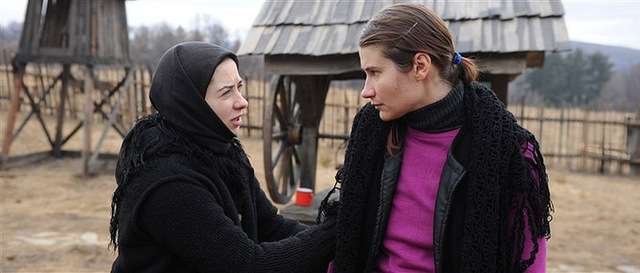
COSMINA STRATAN, CRISTINA FLUTUR IN BEYOND THE HILLS
Long takes, short life
Mungiu's griping, if one-note, new film comes from a 2005 news story that caused a big stir in Romania: a girl went to visit a friend at a remote nunnery and died while its members, led by the priest in charge, were performing an exorcism on her. But the director revised the story into his own style, taking the non-fiction novels of atiana Niculescu Bran as a starting point. Elaborate action sequences are shot in long widescreen takes, like Naranjo's Miss Bala; only this is nothing like Miss Bala: these are two girls and a group of nuns scurrying around up on a hill. What Mungiu also added was the history of a relationship, studiously not (quite) lesbian but certainly intimate and deeply loving, between the two girls when they were growing up in an orphanage. So the unfortunate visitor, Alina (Cristina Flutur), a somewhat mannish young woman who has been lonely in Germany without her friend and has lost touch with her foster parents, arrives at the nunnery with no one, hoping her beloved Voichita (Cosmina Stratan) will come away with her. But Voichita, who originally only came for a visit herself, has by now taken Jesus and the local priest's very austere, judgmental form of Eastern Orthodox Christianity as her new world and comfort, and she refuses to go away. This and the repressive environment, which she wants to adjust to but can't, cause Alina to freak out and she begins having fits of violence and anger. A trip to the hospital under restraints helps temporarily, but back with the nuns she soon has a fit again. Perhaps she is insane; but fundamentalist Christianity seems unable, officially anyway, to adjust to the idea of mental problems, and the priest, followed by his obedient flock of nuns, chooses to start saying the girl is possessed by Satan.
Mungiu himself is saying two things here, interpreting the actual events. First, contemporary Christianity in this strict Orthodox form provides ritual and belief and a long list of potential sins, but doesn't lead people to be kind to one another. Second, in a lastingly traumatized post-Soviet Eastern Europe too society is numbed and people are poor responders to personal human emergencies.
In describing its events the film seems to me much too drawn out and repetitious. The long handheld takes shot by Oleg Mutu are fine, their muted colors and dark shadows dramatized by the snowy exteriors of a severe winter, but there needs to be fewer of these takes. (Mungiu says that there was another half hour that he cut out with difficulty.) On the other hand, the acting and staging and writing are certainly good. One could just say this is Bressonian and leave it at that. A Man Escaped and Diary of a Country Priest are repetitious too. But they are Bresson, which Mungiu isn't. There is a drab ordinariness that gets in the way of the spiritual in a Romanian film. Mungius lacks a sense of the spiritual. Despite an effort at evenhandedness and avoidance of pointing blame, it is hard to appreciate that these nuns and their priest have any kind of spiritual life. We don't get any sense of the place's rituals or of the symmetry and peace they might bring. There aren't even scenes of group prayer or music. And though he may not be demonized, neither is the priest (Valeriu Andriuta) ever given a charismatic moment. Nor are the nuns indiidualized as the monks obviously were in Xavier Beauvois' 2010 Cannes Grand Prize winner, Of God and Men. So for all the 150 minutes and the self-consciously neutral, realistic approach, there's a lot left out of the picture.
I can't deny that Beyond the Hills is compulsively watchable. But despite showing the distressing downward spiral of a young woman who winds up literally chained to a wooden cross, it's more predictable than and not as emotionally disturbing and intense as Mungiu's previous 4 Months, 3 Weeks and 2 Days (2007), which won the Golden Palm at Cannes, putting him and Romanian cinema in general decisively on the international map.
Dupa dealuri (the original title) debuted at Cannes, where it won Best Actress (jointly for Stratan and Flutur) and Best Screenplay awards. Also shown at Toronto and Hamburg. French release secheduled for November 21, 2012. Screened for this review as part of the New York Film Festival at Lincoln Center.
Last edited by Chris Knipp; 09-22-2012 at 03:20 PM.
-
Jun Lana: BWAKAW (2012)
JUN LANA: BWAKAW (2012)
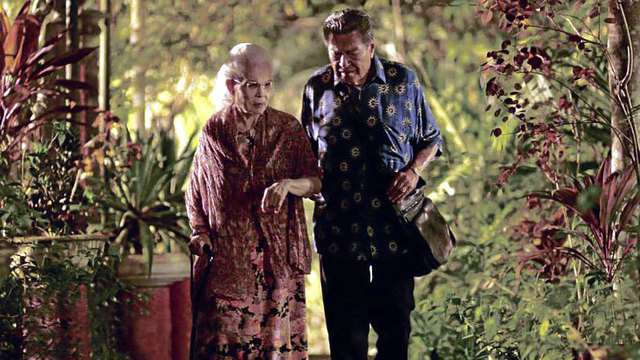
ARMIDA SIGUION REYNA AND EDDIE GARCIA IN BWAKAW
Man, dog, and closet
An aging, long-in-the-closet gay man, a no-go love affair, and a dying dog make this touching film with veteran star Eddie Garcia whom director Lana has described as "the Clint Eastwood of the Philippines." Let's imagine for a minute Clint actually playing this role. It ain't happening. Let's also look at Mike D'Angelo's Toronto tweet review (I do not hide my admiration for D'Angelo's terse Twitter coverage). He gives it a 56, a creditable but not great score in his system, and says, "Bit of pathos overload—lonely aging gay protag coping with unrequited love and a dying dog. Honest & direct, which helps." What's admirable about Bwakaw is its peaceful, rambling accumulation of narrative details that also gradually build up a sense of slowly earned caring for Rene (Garcia) -- the character based on a real person the writer-director knew. And because Rene is a chilly, grumpy, downright hostile type, sentimentality is safely tamped down, despite the inevitable "pathos overload" of the story content.
In a post-screening discussion there was mention of Umberto D. I was reminded a little of the Roman screenwriter Gianni Di Gregorio's 2008 directorial debut Mid-August Lunch, which though distinctly different, seems a more interesting comparison. Di Gregorio's world is glossy, Mediterranean, and very Italian. His alter ego, Gianni, is not gay, and his mother is not dead. But he lives with her as Rene did with his. He like Rene he is essentially alone and has nothing to do. Rene's world is more primitive and Third World. But perhaps because of that, life pushes its way in a bit more, particularly in the person of Sol (Rez Cortez), the rough, gangsterish tricycle cab driver whom Rene at first hates, then bonds with, then hopelessly loves.
Rene by his own "honest & direct" declaration to his priest (whom he "confesses" to only to revise his will) has been a lifelong "coward." He strung along Alicia (Armida Siguion Reyna) for fifteen years pretending to love her as she loved him. Now he visits her at a retirement home, where she can't remember him, till in a moment of clarity she does and he can ask her forgiveness. It took him well into old age to own up to his homosexuality. And when he tries to kiss a sleeping Sol after they've gotten drunk together, it's to "see what it feels like." He's never even kissed a man. But the "pathos" of this avoids "overload" (at least fitfully, throughout) through humor, some of it macabre, like the coffin Rene has bought in a "summer sale' and must take possession of when the funeral home goes out of business. He tries it out at home and finds it more comfortable than he'd expected. Later to avoid a friend's (comically) twisted face in death he practices a fixed smile while laid out in faux-death. A folk religious note comes through a Jesus figurine his mother slept beside all her life, which is reputed to have healing powers. His hairdresser friends Zaldy (Soxie Topacio) and Tracy (Joey Paras) add a trashily camp gay note. Due presumably to his sudden interest in Sol, Rene yields to their dubious suggestion and gets a dye job that makes him look like an even prunier-faced Ronald Reagan.
The dog, Bwakaw, is a stray in the neighborhood Rene fed and semi-adopted, but never showed affection for. And like Uggie, the dog in Michel Hazanavicius' The Artist, Princess, the accomplished trained acting canine in this movie, becomes the co-protagonist. When she becomes ill she turns into Rene's main preoccupation, the Muguffin if you will that teaches him to feel and by releasing sadness enables him to embrace life again. He unwraps all the objects in the house he'd packed away after his mother's death and labeled for his handful of chosen "heirs," the gay hairdressers and coworkers at the post office, where he's been showing up every day to do chores even though he's retired, just to have something to do. The house looks radiant and Rene walks off into a lush winding forest road, shot from above.
Bwakaw is a little long (at 110 min.) and definitely episodic and its protagonist is slow to grow on you, but ultimately this is a movie that can appeal even to the hard-hearted, except that it sometimes doesn't, due to the off-putting title and the bleak plotline. In addition, thanks perhaps to the hurried shoot imposed by a low budget, there are some wrong notes. After the still quite young Bwawkaw has gotten sick and been diagnosed with cancer, she still seems awfully perky at times. (In truth simulating cancer may be too great a challenge for even the most talented canine.) When Minda (Luz Valdez), the post office friend, becomes ill, Rene steps out of his dour character a bit too much in giving her a pre-op party. Surely Rene's frequent visits to the handsome young priest Father Eddie (Gardo Versoza) reflect an attraction, but that's an aspect that's fudged on screen. The alterations in Rene's mood are a bit on the crude and abrupt side, the film's fault, not Eddie Garcia's. And despite the sociability of Filipino culture we don't feel a social context here as we do in the Italian films I've mentioned. But Bwakaw is a respectable and original effort. Rene is a genuinely memorable character, both unique and expressive of something basic in the human condition, that we are all alone, and we all must die.
Bwakaw debuted at the Cinemalaya Philippine Independent film festival in July 2012 and was also shown at Toronto in September; and at the New York Film Festival at Lincoln Center a month later. Screened for this review as part of the NYFF. It has been chosen to be the official entry of the Philippines to the Best Foreign Language Film competition at the 85th Academy Awards 2013. In a Skype Q&A director Lana reported the local release was brief but lucrative enough to break even on expenses. He also mentioned that Eddie Garcia very willingly took on the role, and that Princess has her own TV series and besides that is trained as a bomb-sniffing dog.
Last edited by Chris Knipp; 09-24-2012 at 09:02 PM.
-
Valaeria Sarmiento: LINES OF WELLINGTON (2012)
VALERIA SARMIENTO: LINES OF WELLINGTON (2012)
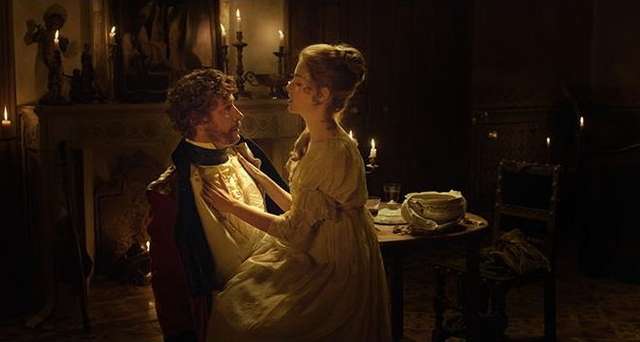
Napoleon's forces chaotically routed in Portugal
Described as "An epic set in and around the Battle of Bussaco (1810)" and designed as a TV mini-series, this handsome-looking 151-minute costume piece, which has nice crowd scenes, is a meandering and episodic war story that recreates the chaos of Tolstoy's Battle of Waterloo without the grandeur and ultimate sense. There are many mini-plots, none of which catch lasting emotional hold. The film represents a project begun by the lat Raúl Ruíz, completed by his widow, Valeria Sarmiento. A cast almost absurdly rich in well-known names includes John Malkovich (as Wellington), Catherine Deneuve, Isabelle Huppert, Mathieu Amalric, Vincent Pérez, Marisa Paredes, Chiara Mastroianni, Melvil Poupaud, Michel Piccoli, Elsa Zylberstein, Christian Vadim. Vincent Lindon, and Malik Zidi. Malkovich is ageeably diseagreable as usual, and Amalric does a voice-over in French, but most of the others just appear in brief 'wow" cameos. Despite big festival showings (Venice, Toronto, New York) and a theatrical release, this isn't a film that has box office potential and may function best as a rainy day soporific.
There is barely any one thread (other than the fact of the war going on) that links the whole rambling thing together, or makes us care, and that includes the fortifications referred to as the Lines of Wellington. The atmosphere, and the historical events referred to, would be of special interest to Portuguese viewers, though as in Ruíz's previous work the confounding but rich Mysteries of Lisbon, there is dialogue in English, French, and Portuguese.
Jay Wsissberg sums things up in his Variety review thus: "Expectations were high, given Ruiz's pre-production input and the participation of "Mysteries of Lisbon" scripter Carlos Saboga, along with d.p. Andre Szankowski, but alas, "Wellington" is stringy beef. Aiming for a Tolstoyan vibe that personalizes history's great events, the pic is big, but not big enough; historical, but not exactly accurate; and the extra stuffing, which made "Mysteries" a treasure box of discoveries, here feels merely undigested."
Telling a story of masses of man and large events while focusing on the ordinary folk and still including scenes of major figures is a tricky balancing act, and this film does not perform it successfully, seeming indeed indifferent to the need for subordination and clear guidelines.
A wounded lieutenant, Pedro de Alencar (Carloto Cotta) is the closest thing to a linking figure. He appears repeatedly, first wounded on the battlefield, then in hospital, later escaping in hospital gown to be protected by an older lady, finally, recovered serving in a motley unit till he rejoins the platoon he commanded originally.
But if this is a "miniseries," maybe it was cut, and cut badly. The original intentions of Carlos Saboga may have been lost -- or never defined. An unfortunate aspect, for following the action in a feature film format, is the lack of intertitles and the frequency in which characters occur who speak both Portuguese and English and are of mixed origin. With a chaotic palette it would have helped to draw the lines carefully and clearly. It's not that difficult; but it's not that easy, either.
What we learn at the outset is that the Portuguese allied with the English are the local victors, but have to withdfaw because the French still outnumber them. The finale leaves us with a vague sense of victory for the Portuguese-British side, but without anything to rejoice over. The final text describes the country as ravaged for years to come by this warfare.
As Weissberg says, if you loved Mysteries of Lisbon (which does have its enchantments despite its being harder to follow) there may be some carry-over to liking Lines of Wellington. But not much, really.
Screened for this review as part of the New York Film Festival at Lincoln Center.
Last edited by Chris Knipp; 10-10-2012 at 05:56 AM.
-
Song Fang: MEMORIES LOOK AT ME (2012)
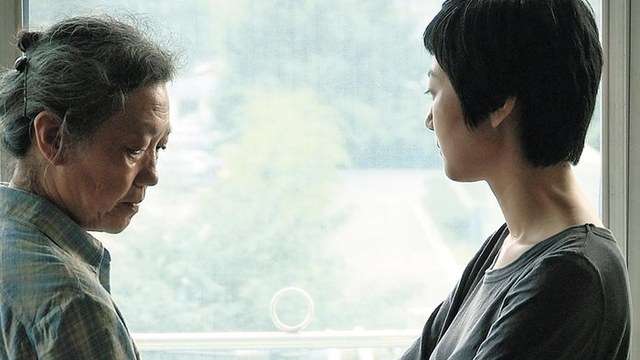
YE YU-ZHU, SONG FANG IN MEMORIES LOOK AT ME
The mundanity of it all
In Oliver Glodsmith's 1760-61 pseudo-Chinese letters called The Citizen of the World, there's a moment when an Englishman expresses disappointment at the Asian visitor's talk. He'd been expecting exoticism and arcane wisdom, and all he is hearing, he says, is "mere chit-chat and common sense." That is the shortcoming of this new prizewinning feature from Song Fang. It is a cozy in-family celebration of Chinese matter-of-fact-ness so unwavering as to be numbing. There are fundamental truths about life here, but they are buried in the non-drama. As the Hollywood Reporter reviewer Stephen Dalton put it, only the "most serious art-house cinema" audience will warm to Song's "narrow focus and chilly film-school minimalism."
The young female director had full cooperation from her mother and father and other family members in shooting this docu-drama in which she comes for a visit and talks at length with her parents and particularly her mother about aging, her grandmother's death, and other day-to-day issues. The focus is on aging and on how memories link family members. There are links with the documentary fiction of the film's producer Jia Zhangke and also of the low keyed focus of Hou Hsiao-hsien. Song starred in Hou's Parisian-set Flight of the Red Balloon (NYFF 2007). Song's delicacy and the clean lines of her editing and cinematography (rudimentary equipment doesn't keep there from being some beautiful, simple images), plus the focus on humanistic concerns that are universal, won her the Best First Feature prize at Locarno.
However, a scene in whch Song's mom takes her dad's blood pressure and finds it at an all-time low provides a metaphor for the whole film: the claustrophobic indoor "action," which consists of sitting around and talking, is so delicate and matter-of fact that it will lower your blood pressure, and maybe even put you to sleep. How much do you really care when Song first went to middle school, or why she thought her mom looked older than other moms then? As the chit-chat and common sense spill calmly out of mouths, the humanism becomes hard to discern from the mundane detail, and Song's film does not sing. However, the film has a simplicity, purity, and natural flow that make one understand the Locarno jury's admiration. But then I think of Edward Yang's Yi Yi and this dwindles to a tiny scribble. Rigorous this may be, and economical it certainly is, but it also seems lazy, hugely unadventurous, and numbingly lacking in cinematic verve.
The transliterated Chinese title of Memories Look at Me is Ji Yi Wang Zhe Wo.
Screened for this review as part of the New York Film Festival at Lincoln Center.
Last edited by Chris Knipp; 10-11-2020 at 09:25 AM.
-
Paolo and Vittorio Taviani: CAESAR MUST DIE (2012)
PAOLO AND VITTORIO TAVIANI: CAESAR MUST DIE (2012)
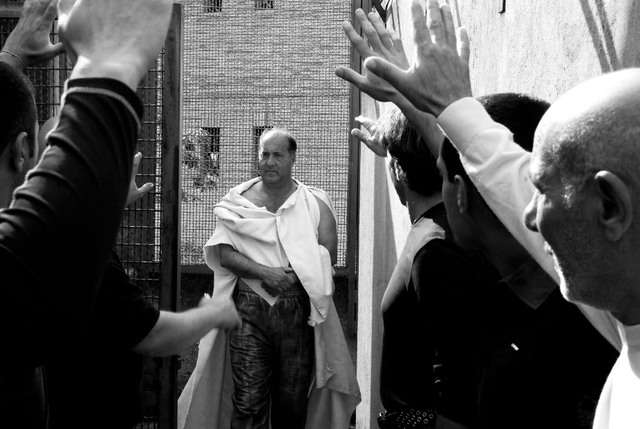
GIOVANNI ARCURI AS CAESAR IN CAESAR MUST DIE
Shakespeare in a Roman prison
The prolific Taviani brothers (of Padre, Padrone and Night of the Shooting Stars) focus on the theme of a prison theatrical production in this emotionally strong documentary that focuses on rehearsals, the performance, and the cast's return to their cells in the maximum security section of Rome's Rebibbia prison in Cesare deve morire/Caesar Must Die, winner of the Golden Bear at Berlin and a lot of prizes and nominations in Italy. Unfortunately in the effort to make a polished and performance-like film, certain details have been fudged and when the thrill has passed, the whole thing feels a little less profound and informative than it might have been. Details of the production, such as the fact that the director, Fabio Cavalli, has put on plays at Rebibbia for years and built up a semi-pro cast among the inmates, and how the final performance was actually staged, are left unexplained, and worst of all, every shot, even where the actors have conflicts, rebel, or speak personal asides, seem so obviously pre-rehearsed that one feels robbed of true insight into what went on.
We begin with an overview of what appear to be auditions, in which prisoners are asked to say their basic coordinates -- name, home town, address, and some throw in a lot more -- in two moods: one as if they are leaving their family, and the other as if they have been delayed by the bureaucracy and are angry. So, sad and angry. And from here on, one is gripped by the macho theatricality of the inmates, all of whom come up with strong emotion and some of whom are astonishingly inventive. Next we see a group called out who have been selected as the cast for a proeduction in Italian of Shakespeare's Julius Caesar, which they are directed to perform in their own native dialects. The majority identify themselves as Neapolitan or Sicilian, though one says he has no dialect and just speaks Italian. Subtitles for the main cast members give their part and their sentence and the crimes for which they have been convicted -- drug trafficking, murder, organized crime activities -- for which some have already served many years and all will serve many.
Next the film shows the actors memorizing their lines and acting them out among themselves. The opening and closing segments are in color; all the rest, the shots in cells and in hallways and of rehearsals, is in strong, effective black and white (in contrast to the flat B&W digital transfer from color of Noah Baumbach's Frances Ha, also a part of the New York Film Festival). These guys are good, in the sense that they project well, speak clearly, summon up wellsprings of appropriate emotion, and have dramatic flair. On the other hand one may question whether some of them have the right faces to represent the Roman aristocracy. The use of dialects has an obvious value: the actors may thus speak their lines as home truths, the better to identify the betrayals, loss of freedom, resentments, and plotting with their own combined memory of present and pre-jail experiences. Moreover in a Q&A with the directors after this screening, they explained that each actor translated his own lines from standard Italian into his individual dialect, providing them with an intellectually stimulating activity that may bring out an urge to write. On the other hand, the various dialects can be distracting and would break up the unity of the original Shakespearean text. All of which reminds us that this is a novelty and a feat and not a work of art for general consumption, however fascinating it is to study jail performances, as we know from Beckett in prison decades ago.
Rehearsals -- with the mood flare-ups that seem artificial -- blend seamlessly into performance. But here is another place where the Tavianis have fudged and distorted. While it's obvious from the opening and closing sequences that the play was performed on a stage surrounded by large columns before an audience who came in from outside, in the film sequences are staged in hallways and a courtyard of the prison. As Jay Weissberg rightly points out in his Berlin review for Variety, these sequences staged by the directors only for the film distort the desired sense that this is a prison, that the inmates live constantly in small cells, and that they're only "free" in the director's rehearsal space and the final on-stage performance. In this misleading context, as Weissberg says, a shot of part of the play artificially set up with the sky all around above (as it never can be in Rebibbia) "turns the cells into a theatrical construct" when the prisoners are shown being let into them one by one in a sequence that bookends the film.
It's a shame that in the interests of evaluating the film fully as documentary material, one must focus so much on these various elisions and distortions. Caesar Must Die remains a theatrical-cinematic artifact of strong interest that can't fail to move you at certain points when you watch the inmate-actors in action and their skill and their ability to harness "emotional memory" in the Strasberg sense. The language may not mesh and the faces may not always be right, but the energy and fluency of the performances of everyone in the cast are impressive. (It would have been nice to see more instances where someone fumbled or forgot lines or got pointers from the director.) I have to point out another significant tweaking of the situation not acknowledged in the body of the film: the actor who plays Brutus, Salvatore Striano, was released six years ago and brought back to act in the production.
According to those credits the impressive and well-cast Giovanni Arcuri, who plays Caesar, has written a book about "freedom in prison," and the theme of inner vs. outer freedom is one the filmmakers seek to develop, though it would come through much better had they delved more deeply into the details of the play production process and been willing to move back and forth from slick performance to awkward reality. Instead it's all slick performance, even the ostensible off-text scenes.
Weissberg points out that sometimes to the "sharp-eared" or keenly observant the dialects and the prisoners' mafia connections give certain spoken lines an inappropriate or comic overtone, and he notes "distracting post-production dubbing" audible in the alteration of some speeches. On the other hand the fact that some of these men are murderers and have a violent past gives stabbing scenes a chilling double reality. The surging music by Vittorio's son Giuliano Taviani is sometimes derivative or repetitions, but has a generally strong unifying effect, underlining the throbbing emotion and adding to the distinctive look and feel of the film.
Cesare deve moriere debuted at Berlin, as mentioned, where it received the Silver Bear award. It was screened for this review as part of the 20012 New York Film Festival at Lincoln Center, where it is showing Sept. 29 and 30 and Oct. 1 and 8. It already has been or soon will be released in over a dozen countries; no US distributor yet (as of Sept 27, 2012).
Last edited by Chris Knipp; 03-11-2021 at 12:48 AM.
 Posting Permissions
Posting Permissions
- You may not post new threads
- You may not post replies
- You may not post attachments
- You may not edit your posts
-
Forum Rules







 Reply With Quote
Reply With Quote














Bookmarks